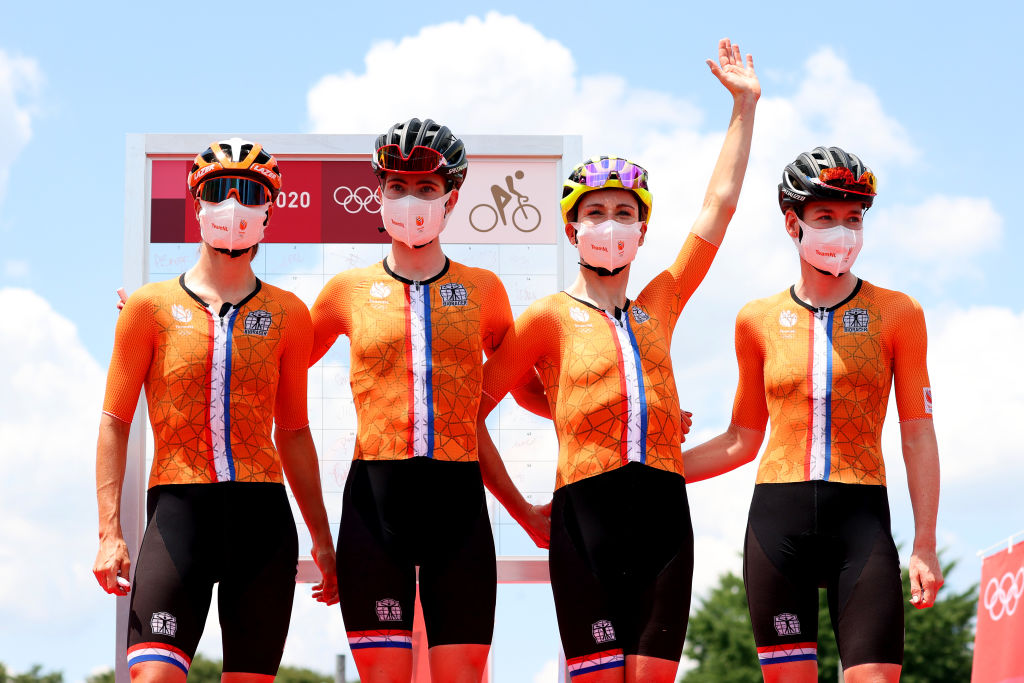Dutch divided at Olympics: Vos knew Kiesenhofer was away, Van der Breggen didn't
Everyone agrees they underestimated surprise winner Kiesenhofer

The women's road race at the Tokyo Olympics was marked by a lack of communication, and not just in terms of the general absence of race radios or the supposed lack of timings updates. Even within the Dutch team, it appears different riders were on completely different pages.
It's clear that Annemiek van Vleuten believed she crossed the line to win the gold medal, and the outgoing champion Anna van der Breggen has said she was similarly unaware that breakaway rider Anna Kiesenhofer was still out front and already celebrating victory.
However, 2012 Olympic champion Marianne Vos has reportedly said that she was fully aware of the race situation, and of the fact that the pre-race favourites were only fighting for silver when they entered the Fuji Speedway in the closing kilometres.
"There were still three riders ahead and we caught two, so I knew there was one more ahead," fifth-placed Vos told Dutch radio, according to AD.
Omer Shapira (Israel) and Anna Plichta (Poland) were indeed caught on the Speedway track but the last surviving member of the days' five-rider breakaway was still two minutes clear.
In complete contrast to Vos, Van der Breggen, who finished 15th, said she'd been told that wasn't the case.
"We took the other women back and thought we were riding for the win, but in the end not so. That's too bad," she said. "We just didn't know that the Austrian was still in the lead alone. We received the information that the Polish rider was the last to be brought in.
The latest race content, interviews, features, reviews and expert buying guides, direct to your inbox!
"It was a race without communication and the leading group took 10 minutes in the beginning. You should actually count how many are coming back and how many are still ahead. We can go to the car to get information, so we did, but in the final you don't do that anymore.
"If you look at what we knew, we calculated it correctly. We just didn't have all the information. If we had all the information, we could have done more."
Van der Breggen, however, appeared to contradict herself over team tactics, perhaps hinting at further confusion in the Dutch ranks.
"From then on we started to race well, because we had prepared well for that late attack by Annemiek on the circuit," she said of the moment Shapira and Plichta were caught, according to AD.
However, she also said, according to Wielerflits: "Basically we said Marianne Vos would sprint and we would close the gap, and we did. In principle it turned out well."
In the Dutch team car, they were well aware that Kiesenhofer was up the road, but were supposedly unable to relay accurate information to their riders.
Unlike most races on the professional calendar, in the Olympics riders do not have earpieces to directly receive information from their directors, instead relying on time gaps held up on a whiteboard from a race official on a motorbike. During an early attack, Van Vleuten had to ask a TV motorbike for time gaps, suggesting a severe lack of communication.
"We received little information from the race in the car and in many places it was not possible to pass on anything to the riders," said Dutch coach Loes Gunnewijk. "We don't have earpieces and on that last lap around the track we couldn't get up with the car. Only then did I realize that it was not clear to the riders that there was still someone ahead."
Vos, however, suggested there were few excuses to be made.
"It was difficult with communication, but you know that in advance. Without earpieces you have to make do with the information from the side. In retrospect, it is easy and you would have done it differently, that is clear."
What everyone in the Dutch camp could agree on, however, was that they had underestimated Anna Kiesenhofer, who snatched the title they have held for almost a decade.
"We came close, but we underestimated Kiesenhofer's strength. Did I know her? Yes, by name," Vos said. "It was an incredibly strong ride from her."
Van der Breggen, meanwhile, didn't have the Austrian on her list of breakaway riders who could potentially pose a danger.
"I don't think anyone had written her on the list. Neither had I, because I don't really know her," she said. "We underestimated her."
Cyclingnews is the world's leader in English-language coverage of professional cycling. Started in 1995 by University of Newcastle professor Bill Mitchell, the site was one of the first to provide breaking news and results over the internet in English. The site was purchased by Knapp Communications in 1999, and owner Gerard Knapp built it into the definitive voice of pro cycling. Since then, major publishing house Future PLC has owned the site and expanded it to include top features, news, results, photos and tech reporting. The site continues to be the most comprehensive and authoritative English voice in professional cycling.